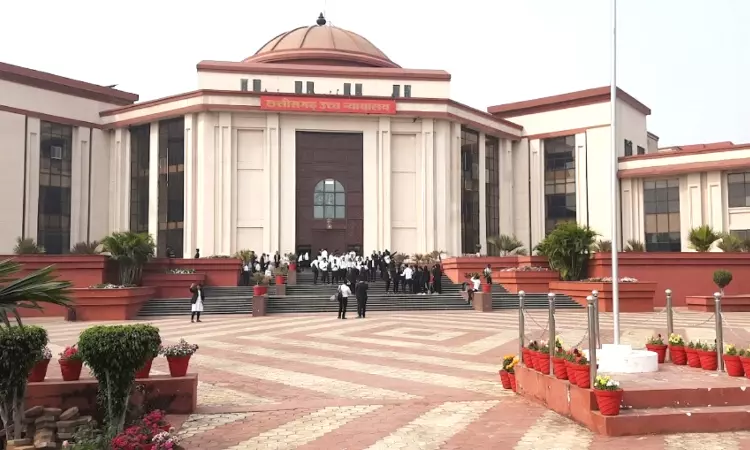- Home
- /
- High Courts
- /
- Chhattisgarh High Court
- /
- Chhattisgarh HC Rejects Employee's...
Chhattisgarh HC Rejects Employee's Plea For Back Wages After Acquittal In Appeal, Says Subsequent Acquittal Doesn't Operate Retrospectively
Saahas Arora
18 April 2025 10:30 AM IST
Dismissing a writ petition filed by an employee, who was convicted of a crime but later acquitted and demanded back wages thereafter, the Chhattisgarh High Court has held that the subsequent acquittal of the employee does not entitle him to back wages as such acquittal does not operate retrospectively to wipe out the legal consequences of the conviction.The petitioner had prayed that he...
Dismissing a writ petition filed by an employee, who was convicted of a crime but later acquitted and demanded back wages thereafter, the Chhattisgarh High Court has held that the subsequent acquittal of the employee does not entitle him to back wages as such acquittal does not operate retrospectively to wipe out the legal consequences of the conviction.
The petitioner had prayed that he was entitled to back wages upon acquittal under Rule 54-B of the Fundamental Rules, which enables a suspended government servant, who is reinstated or would have been reinstated but for his retirement or superannuation, to be considered for pay and allowance for the period of suspension.
In this regard, a Single Judge Bench of Justice Bibhu Datta Guru, held,
“…it is not the case of the petitioner that he was placed under suspension and directed for reinstatement while revoking the suspension, as he was terminated from service on conviction of criminal charges by the jurisdictional criminal court, therefore, Rule 54-B of the Fundamental Rules would not be applicable.”
Background
The petitioner was employed as a Supervisor (Civil) at the Chhattisgarh State Power Distribution Company Limited (Respondent 2). An FIR was filed against him under Sections 7, 13(1)(d) and 13(2) of the Prevention of Corruption Act, 1988, post which he was placed under suspension. However, since the trial could not be concluded within three years, the suspension was revoked. Later, the Court of Special Judge (Prevention of Corruption Act) Raipur, convicted the petitioner and consequently, his services were terminated. He appealed against the said conviction and was later acquitted. In the meanwhile, he retired from service on account of superannuation.
Post acquittal, the petitioner made several representations before the authorities seeking back wages, however, as the petitioner was unable to provide services owing to the termination caused by initial charges and conviction, the respondent, by an order (impugned order), denied back wages to the petitioner. Aggrieved, the petitioner challenged the impugned order in the High Court.
The petitioner contended that he was entitled to back wages as per Rule 54-B of the Fundamental Rules. Contrary to this, the respondents urged that Rule 54-B of the Fundamental Rules was not applicable as the petitioner was dismissed from service pursuant to his conviction and was not placed under any suspension nor was he reinstated in service on revocation of the said suspension.
Rule 54-B of the Fundamental Rules provides, under sub-rule (1), that when a government servant, who had been suspended, is reinstated or would have been so reinstated but for his retirement on superannuation while under suspension, the competent authority to order reinstatement shall consider and make a specific order regarding the pay and allowances to be paid to him for the period of suspension ending with reinstatement or the date of his retirement on superannuation. The authority shall also determine whether the said period shall be treated as a period spent on duty.
Following the scheme of 'no work, no pay', the Court relied on the case of Munnalal Mishra v. Union of India and others [2005 (3) M.P.H.T. 125 (DB)], where it was held that when a government servant is dismissed or removed or compulsorily retired on the ground of conviction in a criminal case, then Fundamental Rules 54, 54-A and 54-B would not apply.
The Court noted that the petitioner was not undergoing suspension, rather, he was terminated from service on conviction of criminal charges by the jurisdictional criminal court. In such a case, the Court ruled that Rule 54-B of the Fundamental Rules would not be attracted.
The Court also relied on the cases of Ranchhodji Chaturji Thakore v. Superintendent Engineer, Gujarat Electricity Board, Himmatnagar [(1996) 11 SCC 603], Union of India v. Jaipal Singh [(2004) 1 SCC 121], and State Bank of India and another v. Mohammed Abdul Rahim [(2013) 11 SCC 67], to hold that subsequent acquittal does not operate retrospectively to wipe out legal consequences of the conviction.
Dismissing the writ petition, the Court held,
“Concludingly, it is held that Rule 54-B of the Fundamental Rules would not be applicable to the petitioner herein in the present case. Consequently, Rule 54-B of the Fundamental Rules would not be applicable and thus, he would not be entitled for back-wages.”
Case Details:
Case Number: WPS No. 1473 of 2021
Case Title: Ram Prasad Nayak v. State Of Chhattisgarh
Date: 15/04/2025



